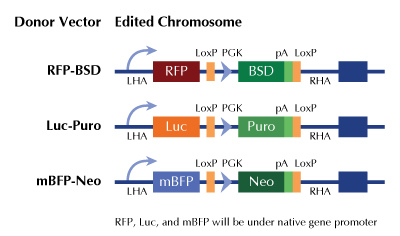G protein coupled receptor 30 (GPER1) Human Gene Knockout Kit (CRISPR)
CAT#: KN203027RB
GPER1 - human gene knockout kit via CRISPR, HDR mediated
Functional Cassette: GFP-puro Luciferase-Puro mBFP-Neo
HDR-mediated knockout kit validation
USD 1,657.00
4 Weeks*
USD 450.00
USD 1,007.00
Specifications
| Product Data | |
| Format | 2 gRNA vectors, 1 RFP-BSD donor, 1 scramble control |
| Donor DNA | RFP-BSD |
| Symbol | G protein coupled receptor 30 |
| Locus ID | 2852 |
| Components |
KN203027G1, G protein coupled receptor 30 gRNA vector 1 in pCas-Guide CRISPR vector KN203027G2, G protein coupled receptor 30 gRNA vector 2 in pCas-Guide CRISPR vector KN203027RBD, donor DNA containing left and right homologous arms and RFP-BSD functional cassette. GE100003, scramble sequence in pCas-Guide vector |
| Disclaimer | These products are manufactured and supplied by OriGene under license from ERS. The kit is designed based on the best knowledge of CRISPR technology. The system has been functionally validated for knocking-in the cassette downstream the native promoter. The efficiency of the knock-out varies due to the nature of the biology and the complexity of the experimental process. |
| Reference Data | |
| RefSeq | NM_001031682, NM_001039966, NM_001098201, NM_001505 |
| UniProt ID | Q99527 |
| Synonyms | CMKRL2; FEG-1; GPCR-Br; LERGU; LERGU2; MGC99678 |
| Summary | This gene encodes a multi-pass membrane protein that localizes to the endoplasmic reticulum and a member of the G-protein coupled receptor 1 family. This receptor binds estrogen and activates multiple downstream signaling pathways, leading to stimulation of adenylate cyclase and an increase in cyclic AMP levels, while also promoting intracellular calcium mobilization and synthesis of phosphatidylinositol 3,4,5-trisphosphate in the nucleus. This protein therefore plays a role in the rapid nongenomic signaling events widely observed following stimulation of cells and tissues with estrogen. This receptor has been shown to play a role in diverse biological processes, including bone and nervous system development, metabolism, cognition, male fertility and uterine function. [provided by RefSeq, Aug 2017] |
Documents
| Product Manuals |
| FAQs |
| SDS |
Resources
Other Versions
| SKU | Description | Size | Price |
|---|---|---|---|
| KN203027 | GPER1 - human gene knockout kit via CRISPR, HDR mediated |
USD 1,657.00 |
|
| KN203027BN | GPER1 - human gene knockout kit via CRISPR, HDR mediated |
USD 1,657.00 |
|
| KN203027LP | GPER1 - human gene knockout kit via CRISPR, HDR mediated |
USD 1,657.00 |
|
| KN403027 | GPER1 - KN2.0, Human gene knockout kit via CRISPR, non-homology mediated. |
USD 1,657.00 |
|
| GA101914 | GPER1 CRISPRa kit - CRISPR gene activation of human G protein-coupled estrogen receptor 1 |
USD 1,657.00 |
{0} Product Review(s)
Be the first one to submit a review






























































































































































































































































 Germany
Germany
 Japan
Japan
 United Kingdom
United Kingdom
 China
China
